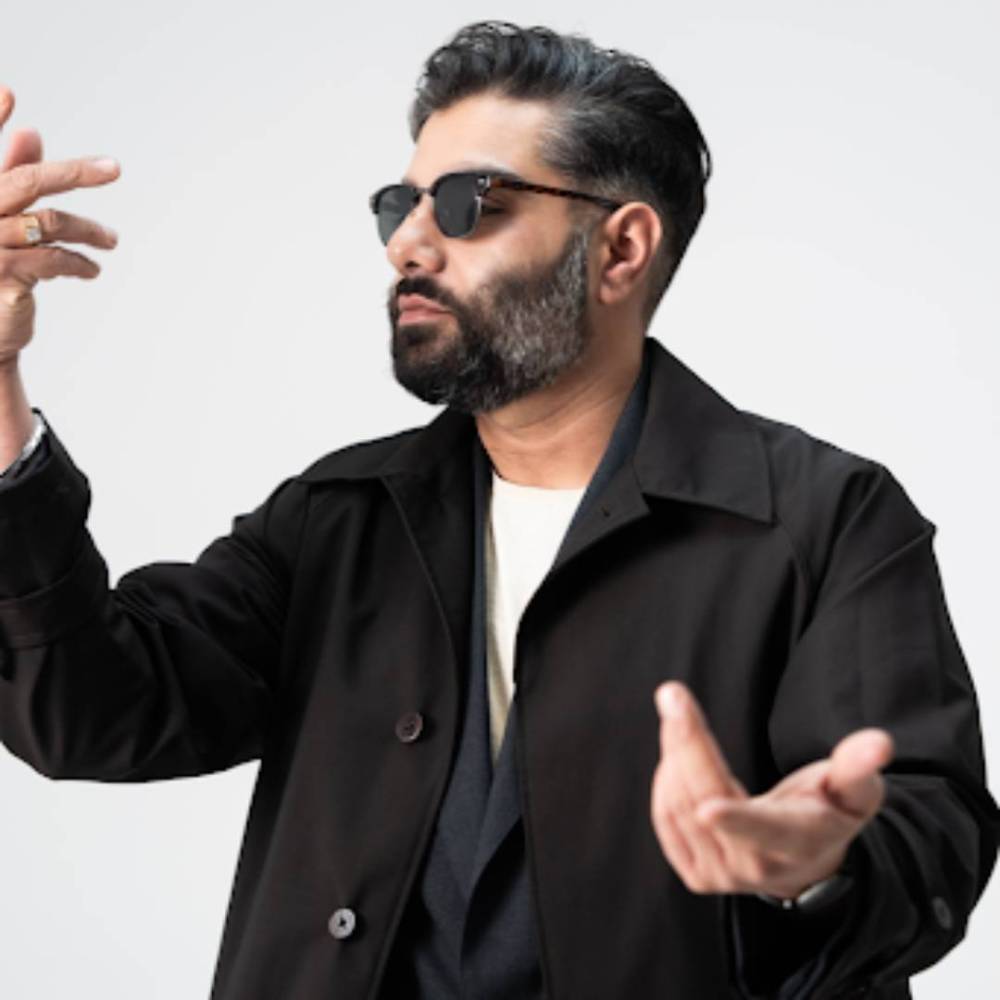Image via Atif Ateeq
Pranav Trewn finds peace in his vinyl record collection.
Over the last couple years, Gaurav Nagpal has emerged as the most inventive producer of the South Asian diaspora. Under the moniker Lapgan, he approaches hip-hop beats as a canvas for historical revisionist fiction – spinning slappers out of samples from India’s earliest sonic epochs, through the country’s empires, colonization, and partition, to its modern imprint on global media. His second-generation perspective – apparent in his equal love for the likes of Madlib and Mirza Ghalib – was so fully-developed upon arrival, that it served as a signal flare, calling in particular to a kindred spirit and his forefather of cross-pollinated contemporary hip-hop.
Himanshu Suri – aka “Heemy Heemy, Queens born and bred…family from Pakistan, I’m Hindu-Punjabi,” aka “It’s Herman, I’m swerving, the nervous MC…The worst rapper on this track, third coolest,” aka “Back street stroller, hash-tree roller/ Chole bhatura eater, heater holder” – introduces himself better than any journalist could. Heems earned the status of a preeminent satirist for the blog era, furnishing collegiate references in flippant flows that belied the earnest and studied respect he has for rap culture. Alongside Kool A.D. and hypeman Dapwell, he held a brief but outsized influence on the laptop-rap set. After the trio disbanded, Heems embarked on a solo career, collaborating with other young critical darlings of the day like Dev Hynes, Danny Brown, and Action Bronson. His most recent arc was an inspired pairing with actor-MC Rizwan Ahmed and producer Redinho to push post-colonial bars over pre-colonial beats as the Swet Shop Boys.
Heems has since kept a low profile, working behind the curtain these last several years in the curation side of the industry. He was already readying a comeback record for later this Spring – named in conjunction with the hybrid enterprise Veena, a combination label, lifestyle brand, and digital magazine – when he stumbled upon Lapgan, whose mixtape-as-thesis History he quickly signed to be the brand’s inaugural release. Their partnership turned into a friendship that naturally produced a steady stream of new music, eventually yielding a full-length collaboration between the two.
The resulting record, out this Friday in partnership with Mass Appeal India, proved so fruitful – reawakening Heems’ dormant instinct for introspective but irreverent quotables – that he scheduled it ahead of Veena. That solo LP is still on deck for later in 2024, but for now Lapgan and Heems are focusing on the release this Friday of their joint-statement LAFANDER. The album is 12 track unapologetic rundown through the streets of Jackson Heights all the way to Delhi’s Hauz Khas, making dozens of stops along a IYKYK heritage trail for the heads. Calling in favors from across his vast network of underground contemporaries, Heems pulled together an ensemble cast including the likes of Kool Keith, Quelle Chris, Open Mike Eagle, Blu, Fatboi Shariff, and Your Old Droog, among others, all of whom discovered creative pockets in the novel timbres and rhythms of Lapgan’s raw materials.
But no one sounds more invigorated than Heems, who fires off several of his best performances to date, from the rumbling, Das-Racist-like ramble of “I’m Pretty Cool” to the anthemic commandments of “Kala Tika” to the long-beloved studio-recreation of the affecting “T5” coda he performed on Colbert. Heems’ renewed songwriting spirit, Lapgan’s savant-level source material splicing, and the pair’s intuitive interplay results in the most unabashed and affirming South Asian scripture since Heems’ own Cashmere nearly eight years ago.
I spoke with Heems over Zoom last week about his origin story, his return to the mic with LAFANDER, and all that took place in between. He brought to our conversation an encyclopedic knowledge of the history of South Asian contemporary music, tracing the arc of representation in his chosen genre and reflecting on his place within that development.

